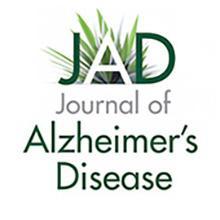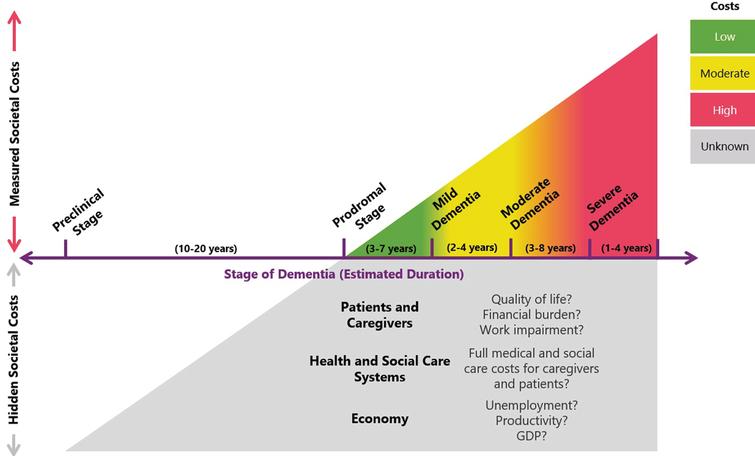29 July 2019

Cambridge, UK – A new research review highlighting the hidden costs of dementia suggests that traditional measures only show the “tip of the iceberg” of the cost impact on society. The analysis, from an international team of experts from academia, research institutes, health care organizations, consulting firms and Alzheimer’s Research UK, looked at the true cost of Alzheimer’s disease and Related Dementias (ADRD).
The study found that socioeconomic costs such as the cost of healthcare for care partners/carers, reduced quality of life and “hidden” costs that stack up before diagnosis are overlooked by current estimates of the condition’s economic impact. The authors argue that better data on the extent of these costs is vital for informing future dementia policy. The paper is published in the Journal of Alzheimer’s Disease.
Some of dementia’s hidden costs explored in the analysis include:
• People developing other health conditions, such as anxiety or depression, as a result of caring for someone with dementia.
• Families forced to cut back on spending or to use savings to support their loved ones.
• Reduced quality of life for people with dementia and their care partners/carers.
• Costs that are incurred in the years before a diagnosis of impairment or dementia is made.
Currently, dementia is estimated to cost the US economy $290bn a year; the UK economy £26bn a year, and $1tn globally. A team of experts from institutions in the UK, Canada, Spain and the US* reviewed existing evidence to assess what different costs are associated with dementia and analyse how these costs are measured. The review included studies that measured:
• direct costs (the cost of health care and paid-for social care),
• indirect costs (such as informal care provided by loved ones and reduced productivity from people being unable to work), and
• “intangible costs” (including the reduced quality of life experienced by people with dementia and their care partners/carers).
Current estimates of ADRD/dementia only look at direct and indirect costs.
The analysis showed that most official estimates of the cost of dementia fail to capture a number of hidden costs. For example, several studies showed that people who are caring for someone with dementia may be more likely to develop conditions such as depression, anxiety and hypertension – with each of these conditions carrying their own cost of care.
Many studies also showed that families can find themselves forced to cut back on expenditure or dip into savings in order to support a loved one with dementia.
The review also found that current estimates rarely account for the reduced quality of life experienced by people with dementia and their care partners/carers, with no standard measure for capturing these changes – making it harder to assess whether treatments and policies are improving people’s lives. The diseases that cause dementia are often not diagnosed in the early stages, symptoms are often misattributed, misdiagnosed or ignored, and many studies showed that the socioeconomic costs of these diseases typically begin in the years before a diagnosis is made. These could include the cost of diagnostic tests to rule out other conditions as symptoms start to manifest, higher costs of managing other health conditions that may be worsened by the person’s dementia, and declining quality of life.
Alireza Atri, MD, PhD, senior and corresponding author of the study and Director of the Banner Sun Health Research Institute in Arizona, said: “We found staggering inconsistencies between how costs of dementia are calculated across studies and our analysis strongly supports that current estimates fail to recognise the true costs of the diseases, such as Alzheimer’s, that cause dementia. Some studies have estimated that out of pocket expenses for people with dementia are up to one third of their household wealth in the final five years of their life, and that caregivers have healthcare costs that are twice as high as non-caregivers. We also found evidence that costs begin rising up to 10 years prior to diagnosis – we need to better measure and factor all these into future societal cost estimates."
Dr. Atri went on to say: “We must come together to develop and implement comprehensive national dementia prevention, treatment, care, workforce education and training, and research action plans that better measure societal impact; to promote private-public partnerships; and to focus priorities, policies and plans to combat ADRD. To succeed, we must do so not just through local and national governments and organizations, but also in a coordinated way internationally, with governments, industry, and through federations and health organizations such as Alzheimer’s Disease International (the federation of national Alzheimer’s associations) and WHO, in order to drive policy and expand on recent steps forward such as the Osaka G20 Summit declaration that recognized dementia as a global health priority. This is not a “their problem”, it is an ”our problem” – we are all stakeholders, the bell tolls for all of us, and we have to act now – not in isolation but in a coordinated, strategic, systematic, and resolute way, locally and globally; we can’t afford not to."
Other study co-authors resonated and expanded on Dr. Atri’s statement and the study findings.
Strategy consulting firm Shift Health's Dr. Youssef Hayek said: “This study exposes major gaps in our understanding of the full burden of ADRD/dementia to society and challenges us to think differently about how we assess, value and prioritize strategies to mitigate this looming public health crisis – including innovative social care and support systems for patients and families, the integration of novel biomarkers for early diagnosis into routine clinical practice, and the introduction of future disease-modifying therapies."
Dr. Jose’ Luis Molinuevo, Scientific Director of Spain’s BarcelonaBeta Brain Research Center stressed the importance of dementia support infrastructure and prevention, stating “that a properly estimated cost of Alzheimer’s disease and related dementias will result in an enormous impact on our currently fragile supports system and should also reflect on the value of implementing potential preventive strategies.”
Taking a holistic and global view of dementia, Professor Clive Ballard, Executive Dean at the University of Exeter Medical School, stated that “Dementia is a complex condition that often occurs with additional “co-morbid” physical and mental health conditions. To calculate the true needs for people with dementia and the true cost, we must also consider key co-morbidities such as falls, fractures, frailty and the increased risk of infections as well as mental health conditions such as depression, agitation and psychosis. These are huge issues in terms of both high cost and devastating impact on individuals, and they must be considered holistically. The full toll of dementia further highlights the urgency to take global action now.”
Hilary Evans, Chief Executive of Alzheimer’s Research UK who fed into the review, said: “This work highlights just some of the challenges that dementia brings for families, and shows that the impact of the condition often starts years before a diagnosis is made. For anyone with experience of dementia these findings won’t come as a surprise, yet these impacts are not currently reflected in official estimates of the cost of dementia.
“It’s critical that we begin to acknowledge these costs and find better ways of measuring them in order to provide a complete picture of dementia’s impact. Without this, policymakers cannot make informed decisions or understand whether policies designed to meet this challenge are working. We must also continue investing in research to find better treatments and improve the way diseases like Alzheimer’s are diagnosed. Research offers our best hope for ending the fear, harm and heartbreak of dementia and transforming people’s lives."
*The review was authored by experts from Alzheimer’s Research UK, UK; Shift Health, Canada; University of Exeter, UK; Barcelonaβeta Brain Research Center (BBRC) and Pasqual Maragall Foundation, Barcelona, Spain; and Banner Sun Health Research Institute/Banner Health and the Brigham and Women’s Hospital/Harvard Medical School, USA.

Measured societal costs represent only a proportion of the total burden of Alzheimer's disease and related dementias
###
NOTES FOR EDITORS
Full open access study: “Tip of the Iceberg: Assessing the Global Socioeconomic Costs of Alzheimer’s Disease and Related Dementias and Strategic Implications for Stakeholders,” by Youssef H. El-Hayek, Ryan E. Wiley, Charles P. Khoury, Ritesh P. Daya, Clive Ballard, Alison R. Evans, Michael Karran, Jose Luis Molinuevo, Matthew Norton and Alireza Atrig, Journal of Alzheimer’s Disease, Volume 70, Issue 2 (July 2019), openly available at: content.iospress.com/articles/journal-of-alzheimers-disease/jad190426. Published by IOS Press.
Contact
For further information or to arrange an interview with Alzheimer’s Research UK, please contact Kirsty Marais, Communications Manager (+44 7826 559233 or press@alzheimersresearchuk.org) or to arrange an interview with Dr. Atri (study corresponding author) please contact Jennifer Fenter, Banner Health Research (+1 602 839 6324 or jennifer.fenter@bannerhealth.com).
About Alzheimer’s Research UK
Alzheimer’s Research UK is the UK’s leading charity specialising in finding preventions, treatments and a cure for dementia. Our animation “What is dementia?” explains the essentials of dementia and the diseases that cause; view it here. We rely on donations to fund our vital dementia research. To help make breakthroughs possible, donate today by visiting alzheimersresearchuk.org. We are currently supporting pioneering dementia research projects worth nearly £34 million in leading Universities across the UK. How can we challenge perceptions of dementia using only an orange? Find out more at alzheimersresearchuk.org/orange and help us share a better understanding about dementia. #ShareTheOrange
About Journal of Alzheimer’s Disease
Now in its 22nd year of publication, the Journal of Alzheimer’s Disease (JAD) is an international multidisciplinary journal to facilitate progress in understanding the etiology, pathogenesis, epidemiology, genetics, behavior, treatment, and psychology of Alzheimer’s disease. The journal publishes research reports, reviews, short communications, book reviews, and letters-to-the-editor. Groundbreaking research that has appeared in the journal includes novel therapeutic targets, mechanisms of disease, and clinical trial outcomes. JAD has a 2018 Journal Impact Factor of 3.517 according to Journal Citation Reports (Web of Science Group, 2019). JAD is published by IOS Press. j-alz.com







